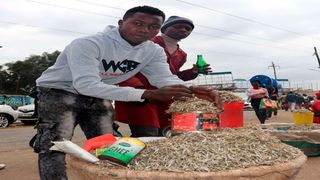
A trader selling Omena outside Wakulima Market, Nairobi on May 27, 2023. Fish consumers in parts of the country could be forced to dig deeper into their pockets to purchase omena due to low supply.
| Bonface BogitaPremium
Omena, once the 'poor man's meal', now out of reach for many
What you need to know:
- What has always been known as the poor man's meal is now unaffordable for many low-income earners, as the price of the delicacy has increased by more than 70 percent in the past month.
- It is a common delicacy in the Luo community and the impact of the high price of the delicacy is already being felt by some families, especially those who cannot afford other sources of animal proteins such as chicken, fish, and meat.
- Ms Quinter Atieno, a food kiosk vendor, told the Nation her profit margins have reduced following the increase in price of the delicacy.
The price of silver cyprinid, popularly known as dagaa in Kiswahili or omena in the local Dholuo language, has almost doubled in the past four weeks, forcing the low-income families in Homa Bay County to switch to other protein sources for their meals.
What has always been known as the poor man's meal is now unaffordable for many low-income earners, as the price of the delicacy has increased by more than 70 percent in the past month.
The increase is attributed to a number of factors.
Omena is sold in tins, with the largest, a two-kilogramme tin, currently retailing at Sh600 from Sh400.
Dry omena, on the other hand, sells for Sh450, up from Sh300 a tin a few weeks ago.
Weekly diet
Ms Lencer Akoth, a mother of two and resident of Shauri Yako, said the delicacy was part of her weekly diet. She buys it from traders in the market and prepares it in different ways.
"My children enjoy eating omena because it is an alternative to fish. I was, however, surprised to find that prices have nearly doubled and I cannot afford to buy and feed my family the way I used to," said Ms Akoth.
At home, she has decided to reduce the frequency of this delicacy.
She has also introduced a substitute meal that provides the same amount of protein.
Egg consumption
"I have increased egg consumption at home and reduced the amount of omena I serve my family," said Ms Akoth.
Kiosk operators are also finding it difficult to adapt to changes in the price of omena.
In Homa Bay town, most people spend no more than Sh100 to buy lunch from food kiosks.
This amount is enough to purchase delicacies such as chapati served with beans or even a plate of chips.
For ugali lovers, this amount can buy a plate of omena with ugali.
However, the amount of omena served has decreased in recent days.
Ms Quinter Atieno, a food kiosk vendor, told the Nation her profit margins have reduced following the increase in price of the delicacy.
At her kiosk next to the Homa Bay Town Post Office, more than 10 people eat omena between 12pm and 2pm.
Boda boda riders
Most of her customers are boda boda riders.
Ms Atieno said she had decided to bear the burden but keep her customers and the price, but reduce the amount of food she serves.
"I have not increased the amount I charge per meal. I have just reduced the quantity of each meal," she said.
According to the trader, some people complain about getting less food when they are served.
"I have to explain the situation to them and whoever wants more food must give extra cash," the trader said.
Fisheries officials in Homa Bay said the low supply of omena was due to several factors including market forces, weather and over-exploitation of resources in Lake Victoria.
Mr George Okoth, the county fisheries director, said omena harvest had declined while demand remained high.
"When the demand cannot match the supply, prices will go up. Most people prefer eating omena because it is cheaper," he said.
According to the official, fishing activities in the lake have also increased over the years.
Protecting the lake
He says many people are getting into the omena fishing business. However, no one is concerned about protecting the lake to ensure the number of fish increases.
"There are more fishermen in the lake today than there were 10 years ago, but the resource base remains constant. This must have an impact on what the lake provides," said Mr Okoth.
He suggested that fishing activities should be regulated to allow the lake to recover from excessive fishing.
"Fishing is a major source of income for hundreds of families around the lake. It is therefore difficult to tell fishermen to reduce the number of times they go to the lake," said Mr Okoth.
It is hoped that the price of the popular fish species will stabilise in the coming weeks.
Homa Bay Beach Management Unit Chairman Alfred Anyango said the rise in prices of omena is a periodic occurrence.
He said omena catch often drops a few days after the full moon.
"We use a system where lights are put on the water surface at night to attract omena before they are taken out of the water. The presence of a full moon has an effect on this activity but only for a while," said Mr Anyango.
The BMU official also cited the high cost of buying fuel as a factor leading to an increase in the price of fish.
He said some fishermen are unable to buy fuel to power their boats before heading to the lake, leading to a decline in fish production, which in turn drives up demand and prices.





